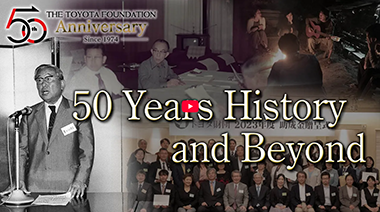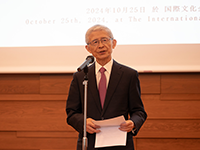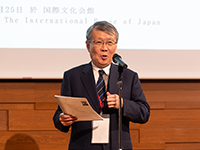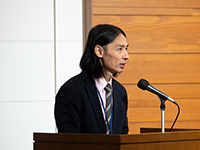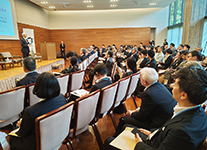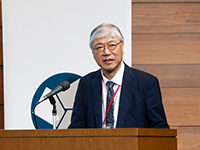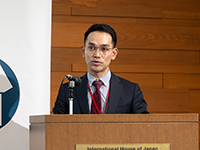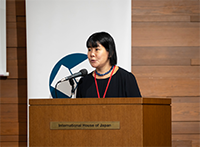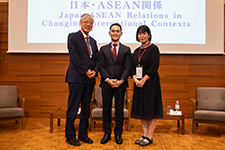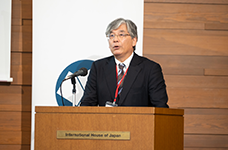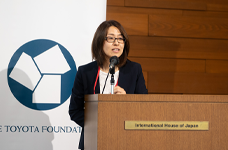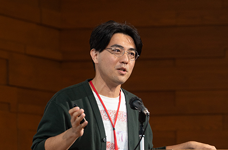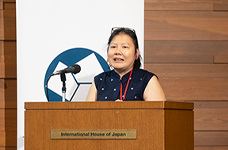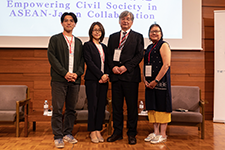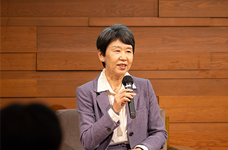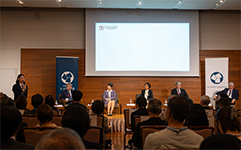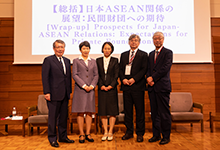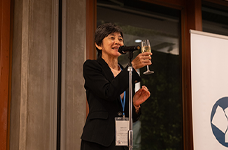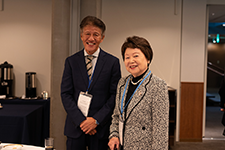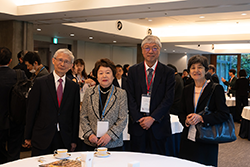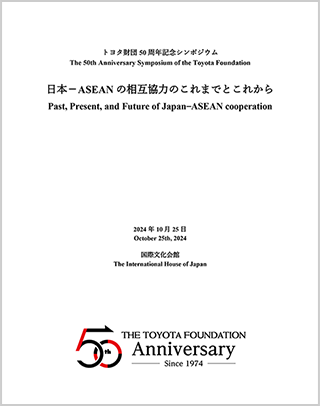December 24, 2024
The Foundation started its international grant program from countries in Southeast Asia.
It was in the early days of the Association of Southeast Asian Nations (ASEAN), which was founded in 1967.
Until today, the Toyota Foundation has continued, albeit in different grant programs,
to support projects or any research initiatives in the region.
To commemorate the 50th anniversary in 2024, the Toyota Foundation held a symposium on Japan-ASEAN mutual cooperation
to not only look back the past but also to envision the new era of Japan-ASEAN relations from a long-term and global perspective
in particular the roles of private foundations in Japan and beyond.
Venue: International House of Japan
Language: Japanese-English (Simultaneous interpretation provided)
Participants: 100 (Invitation-only)
A Report on The 50th Anniversary Symposium of The Toyota Foundation
Past, Present, and Future of Japan–ASEAN cooperation
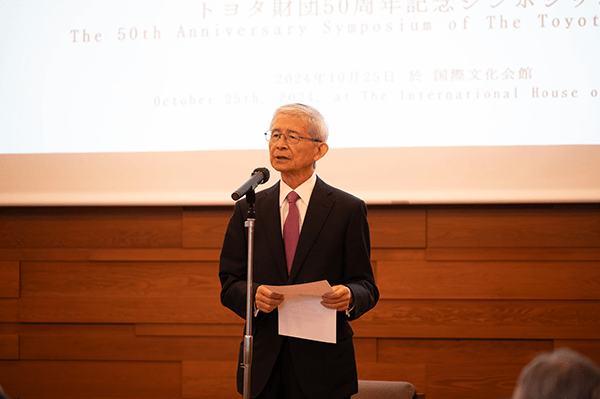
The Toyota Foundation held its 50th anniversary symposium titled “Past, Present, and Future of Japan–ASEAN cooperation” on October 25, 2024, at the International House of Japan in Tokyo.
Since its establishment in 1974, the Toyota Foundation has been committed to grant-making activities worldwide. This symposium was held with a view toward reflecting on Japan’s long-running cooperation with Southeast Asian countries—a region targeted for grants by the Foundation—and exploring new possibilities for the future.
Grantees from Japan and other countries, who implemented research projects related to Southeast Asia mostly since the 2010s, were invited to the symposium, and about 100 of them were in attendance. The symposium was comprised of three sessions—a panel discussion from a macro-perspective, another one from a micro-perspective, and a review and wrap-up—and researchers with wide-ranging fields of expertise and experts from the social sector gathered at the venue and engaged in robust discussions and exchanged their views.
From a macro-perspective: Changes in Japan-Southeast Asia relations
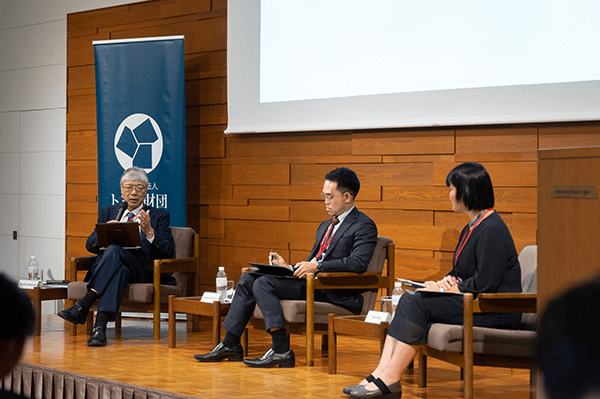
The Session One, titled “Japan-ASEAN Relations in Changing International Contexts,” was moderated by Professor Hiroshi Nakanishi at the School of Government, Kyoto University. As speakers, Dr. Pongphisoot Busbarat, Director of the Institute of Security and International Studies (ISIS), Chulalongkorn University, Thailand, and Dr. Saya Kiba, Associate Professor at Kobe City University of Foreign Studies, delivered their presentation each.
Professor Nakanishi said that dialogues between Japan and ASEAN have continued since 1973 and the history of the Toyota Foundation has evolved in tandem with the development of ASEAN. He argued that the relations now reached an inflection point in the face of the pandemic and ongoing conflicts around the world.
Dr. Pongphisoot talked about the history of trust-based relations between ASEAN member countries and Japan and presented various data. He offered his analysis of how geopolitical risks in the Indo-Pacific region and a U.S.-China confrontation could impact ASEAN’s position in this part of the world. And he stressed the importance of trust built on Japan’s “Fukuda Doctrine” and the role of economic cooperation, highlighting the fact that Japan was an indispensable partner for ASEAN on both economic and security fronts.
For her part, Dr. Kiba referred to her own research on Southeast Asia and discussed common security issues facing ASEAN, democracy backsliding coupled with the rise of authoritarianism, and areas of interest among young researchers. She talked about some challenges that could be addressed by Asia as a whole, beyond the framework of Southeast Asia, and the importance of recognizing divergent views on the U.S.-China rivalry.
In the Q&A session, Professor Nakanishi, the moderator, and participants actively raised questions and voiced their opinions. In response to the questions regarding ASEAN’s security policy, relations with India and the U.S., and a response to a Taiwan contingency, Dr. Pongphisoot expressed a view that ASEAN would prefer to prioritize keeping the status quo rather than confront China with respect to issues surrounding South China Sea and a Taiwan contingency. In addition, he mentioned that India was expected to step up a partnership with ASEAN and increase economic and political clout in the future, in order to counter China’s influence.
Dr. Kiba, meanwhile, stated that the sense of security is broad in Southeast Asian countries. It includes soft topics such as humanitarian assistance and disaster relief, and gender equality in the security sector as an entry point for reform, while there are sensitive topics such as military strategy and structural reform of the armed forces.
Lastly, on the U.S.-China confrontation, Dr. Pongphisoot pointed out that ASEAN would play a certain role under its own unique framework, while Japan would hold an important place as a third choice and be expected to take a cautious stance. Dr. Kiba stressed the need to provide a space in society for having an open discussion among practitioners, researchers, and young people.
From a micro-perspective: Mutual trust forms the foundations
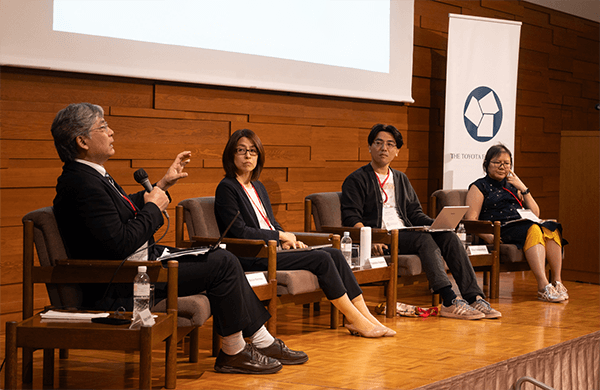
In the Session Two titled “Empowering Civil Society in ASEAN-Japan Collaboration,” Professor Shigeto Sonoda of the Institute of Advanced Studies on Asia, the University of Tokyo, moderated the session. The speakers were Ms. Reiko Harima, the Regional Coordinator for Mekong Migration Network, Dr. Tokihiko Fujimoto, Associate Professor at Meiji University, and Ms. Elisa Sutanudjaja, Executive Director of Rujak Center for Urban Studies. They showcased their stories and expressed their views based on the projects funded by the Foundation.
Ms. Harima introduced strategies taken by civil society organizations to protect and promote the rights of migrant workers in the Mekong subregion. She then elaborated on the case of her own project, emphasizing the importance of cross-country and multi-sectoral cooperation and policy coordination over the issue of migration governance and migrants’ rights protection among ASEAN countries.
Dr. Fujimoto, meanwhile, made a presentation about a case of local energy development through a micro-hydropower generation facility and emphasized how local residents-led efforts on energy and welfare brought about changes in local communities.
In her presentation, Ms. Sutanudjaja focused on sustainable urban development efforts and local communities’ participation in improving Indonesia’s urban environment. She then referred to how these initiatives contributed to empowering civil society and generated social impacts, highlighting the importance of free participation of residents.
Some grant-awarded projects were reviewed in detail and efforts to build trust-based relationships were revisited throughout the session, and the speakers made their cases about how empowering civil society would contribute to sustainable development of local communities.
In the Q&A session, the speakers and audience members compared notes about what it would take to successfully manage international projects and to build trust in dealing with various partners.
Ms. Harima stressed the need to maintain relationships of trust even when organizations involved have divergent views based on their respective stance, and said that long-running relationships between Japan and ASEAN were passed on to the young generation.
For his part, Dr. Fujimoto discussed how to succeed in running such projects and the accompanying challenges of funding management, adding that monetizing successfully would help increase the level of sustainability of projects but at the same time could also lead to dividing communities.
Ms. Sutanudjaja, meanwhile, talked about differences in her partnerships with Japan, Germany, and the U.S. and recognized Japan’s steadfastness in contributing to her long-term collaboration. Moreover, she spoke about a case in which art was used to promote dialogue, underlining the importance of respecting one another and being who you really are in building relationships of trust with local communities.
Lastly, Professor Sonoda discussed the significant role that civil society played and expressed his hope that these cases of trust building through grant-awarded projects needed to be communicated even in the business world.
Building relationships of trust over the next 50 years
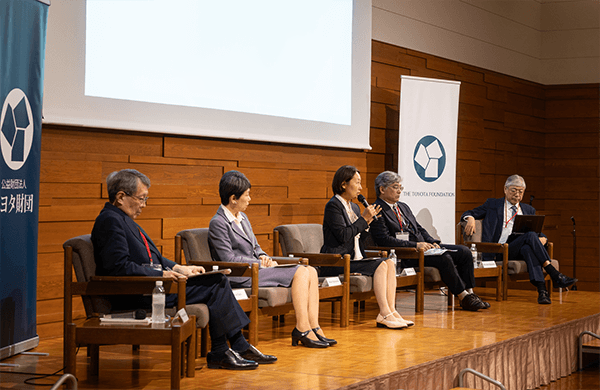
In the final Session Three titled “Prospects for Japan-ASEAN Relations: Expectations for Private Foundations,” the moderator, the Toyota Foundation President Masashi Haneda and commentators held a wrap-up discussion about the role of private foundations, in particular, going forward.
Professor Nakanishi and Professor Sonoda reviewed the sessions that they had moderated, respectively. Then, Dr. Yuri Sato, Executive Vice President of the Japan Foundation, and Ms. Maho Nakayama, Director and Senior Program Officer for the Peacebuilding Program of the Sasakawa Peace Foundation, made comments about approaches to deepening long-term cooperative ties between Japan and ASEAN as well as the role of private foundations.
Dr. Sato said that cultural exchanges and academic collaborations between Japan and ASEAN countries would lay the foundation for future cooperation, arguing that Japan and ASEAN should not only address common challenges but also be ready to involve other regions in tackling such issues. She emphasized that the key would be how Japan could leverage over the next 50 years the trust it had built so far.
Referring to successful cases of Japan-ASEAN collaboration over the past few decades, Ms. Nakayama talked about the need for Japan to carefully identify potential areas of collaboration and approaches. She then expressed hopes for private foundations to play a leading role in collaboration and extending active support to tackling such challenges. She also noted that it was important to share insights and experiences among program officers at private foundations operating in Japan and the rapidly developing ASEAN region.
Professor Nakanishi said that while changes were happening gradually in the minds of Japanese scholars, Japan’s political and government narratives still held onto the notion of Japan being a leading nation and other Asian countries being followers. He indicated that Japanese society was slow to embrace such a changing view of relations between Japan and ASEAN countries.
Meanwhile, Professor Sonoda pointed out that the challenge would be how to sustain relationships of trust between Japan and ASEAN, reiterating the importance of involving various stakeholders in ASEAN as a platform.
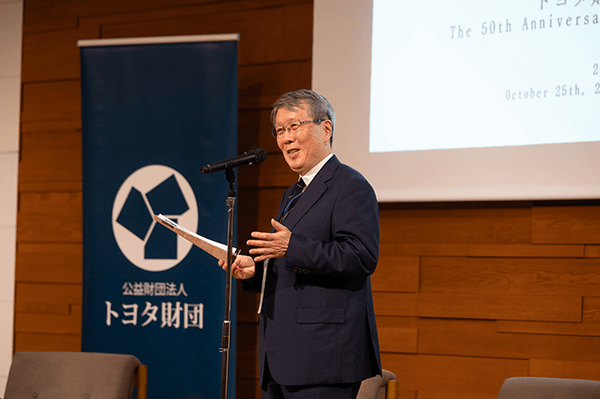
President Haneda expressed concern about fewer opportunities for the Japanese youth to become interested in overseas, particularly Southeast Asia, and stressed the importance of developing an international perspective through exchanges.
Then, Dr. Sato suggested that it should be beneficial to create a place for program officers from private foundations to collaborate and share their experiences of success and failure. In response, Mr. Hideo Tone, program officer of the Toyota Foundation, noted that the Foundation’s current activities were based on its networks of professional connections built over the years of grant-making activities, and that preserving and passing on such trust-based relationships would be crucial.
Through these exchanges of remarks, the commentators noted that relationships of trust and the role of private foundations were prerequisites for cooperation between Japan and ASEAN countries, and they concurred that what would matter for Japan and the international community from now were: 1) having a firm understanding of changing international trends; 2) utilizing a framework of cooperation; 3) and advancing collaboration among different entities.
In his closing remarks, President Haneda stated that the Toyota Foundation would remain firmly committed to supporting cooperative ties between Japan and ASEAN countries and contributing to the development of local communities.
Reaffirming personal connections and embracing new encounters
The symposium participants mingled actively with one another during lunch and coffee breaks and at a dinner reception, deepening their personal connections. The symposium also offered a chance for like-minded, grant-awarded project members to get to know each other, serving to help solidify cooperative ties going forward.
This anniversary symposium proved to be a precious occasion for understanding Japan-ASEAN relations deeply and reaffirming the role of private foundations to play in future development. The Toyota Foundation will continue to take stock of situations in the world and make grants through valuable and various approaches from a global perspective, while looking to the future.
The 50th Anniversary Symposium of the Toyota Foundation
Photo Gallery
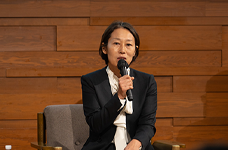
The 50th Anniversary Symposium of the Toyota Foundation
Program
The program of the symposium is available in PDF (1151KB)![]() 。
。
The 50th Anniversary Symposium of the Toyota Foundation

